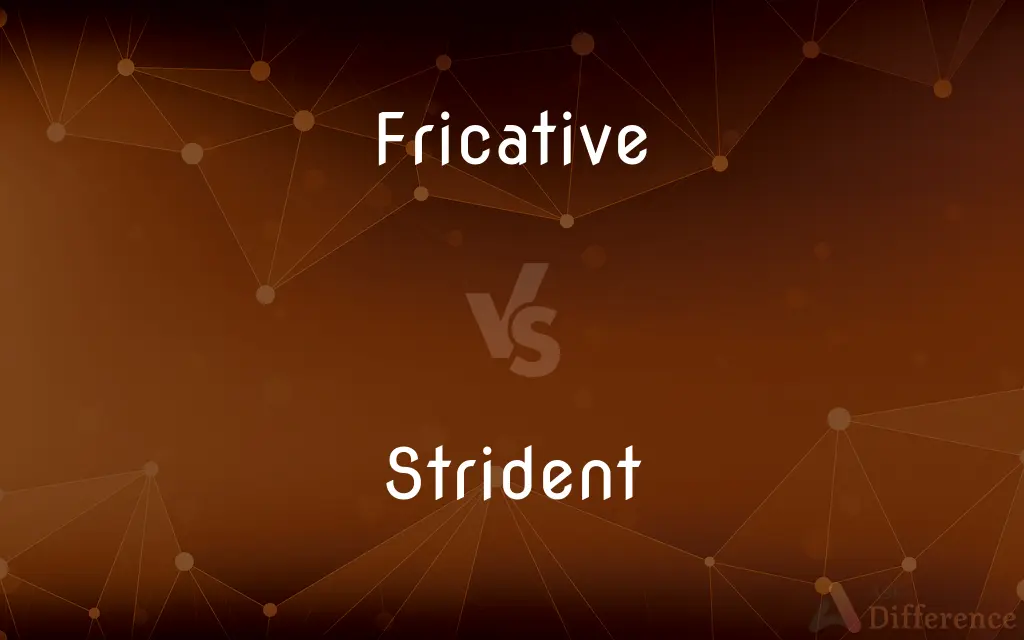Fricative vs. Strident — What's the Difference?
By Tayyaba Rehman & Maham Liaqat — Updated on May 9, 2024
"Fricative" refers to a consonant sound made by the friction of air through a narrow opening in the vocal tract, while "strident" describes a subset of fricative sounds that are particularly loud and high-pitched due to intense vibration.

Difference Between Fricative and Strident
Table of Contents
ADVERTISEMENT
Key Differences
A "fricative" is a type of consonant sound produced by forcing air through a narrow constriction in the vocal tract, creating audible friction. Examples include sounds like /f/, /v/, /s/, and /z/. In contrast, "strident" specifically characterizes fricatives and affricates that are harsh or loud, such as /s/ and /z/, due to their intense and high-pitched qualities.
Fricatives can occur at various points of articulation in the mouth, including labiodental (as in /f/ and /v/), dental (/θ/ and /ð/), alveolar (/s/ and /z/), and glottal (/h/). Stridents, on the other hand, are typically found in the alveolar or post-alveolar regions, exemplified by sounds like /s/, /z/, and the "sh" sound in "shoe."
The mechanism of sound production in fricatives involves a continuous airflow through the mouth, which is partially obstructed. Stridents amplify this effect by increasing the velocity and turbulence of the airstream, making the sound particularly loud and piercing.
All strident sounds are fricatives, but not all fricatives are strident. For instance, the fricatives /f/ and /θ/ (as in "think") are not considered strident because they produce a softer and less sibilant noise compared to the sharper and more intense /s/.
The distinction between fricatives and stridents is particularly relevant in phonetics and speech pathology, as it helps in diagnosing and treating articulation disorders. Stridents, due to their intensity, can be more challenging for individuals with speech impairments to produce accurate
ADVERTISEMENT
Comparison Chart
Definition
Consonants made by air through a constriction
A subset of fricatives that are particularly loud and high-pitched
Examples
/f/, /v/, /θ/, /s/, /z/, /h/
/s/, /z/, /ʃ/ (as in "shoe")
Articulation
Can be labiodental, dental, alveolar, etc.
Typically alveolar or post-alveolar
Sound Intensity
Varies, generally softer
High, due to intense vibration and turbulence
Inclusivity
Broader category of sounds
Specific to louder, high-pitched sounds
Compare with Definitions
Fricative
A type of consonant made by forcing air through a narrow passage in the vocal tract.
The letter f in fish represents a fricative sound.
Strident
Can impact speech clarity.
Excessive use of strident sounds may affect the clarity of speech in noisy environments.
Fricative
Produced at various points in the mouth.
The th sound in think is a dental fricative.
Strident
Often found in alveolar or post-alveolar regions.
The sh in shoe is a strident sound produced post-alveolarly.
Fricative
Part of a broader category of sounds.
Fricatives are integral to the phonetic diversity of languages.
Strident
Typically used to grab attention in speech.
Strident sounds often stand out in spoken language due to their sharpness.
Fricative
Can be voiced or voiceless.
V is a voiced fricative, while f is voiceless.
Strident
Characterized by intense vibration.
Strident sounds can be more challenging to articulate for some speakers.
Fricative
Used in many languages.
Spanish uses the fricative j sound extensively.
Strident
A loud, high-pitched fricative.
The s in snake is a strident sound.
Fricative
Fricatives are consonants produced by forcing air through a narrow channel made by placing two articulators close together. These may be the lower lip against the upper teeth, in the case of [f]; the back of the tongue against the soft palate, in the case of German [x] (the final consonant of Bach); or the side of the tongue against the molars, in the case of Welsh [ɬ] (appearing twice in the name Llanelli).
Strident
Loud, harsh, grating, or shrill
A strident voice.
Fricative
A consonant, such as f or s in English, produced by the forcing of breath through a constricted passage. Also called spirant.
Strident
Forcefully assertive or severely critical
Strident rhetoric.
Fricative
Of, relating to, or being a fricative consonant.
Strident
Loud; shrill, piercing, high-pitched; rough-sounding
The trumpet sounded strident against the string orchestra.
Fricative
(phonetics) Any of several sounds produced by air flowing through a constriction in the oral cavity and typically producing a sibilant, hissing, or buzzing quality; a fricative consonant.
Strident
Grating or obnoxious
The artist chose a strident mixture of colors.
Fricative
(phonetics) produced by air flowing through a restriction in the oral cavity.
Strident
(nonstandard) Vigorous; making strides
Fricative
Produced by the friction or rustling of the breath, intonated or unintonated, through a narrow opening between two of the mouth organs; uttered through a close approach, but not with a complete closure, of the organs of articulation, and hence capable of being continued or prolonged; - said of certain consonantal sounds, as f, v, s, z, etc.
Strident
(linguistics) One of a class of s-like fricatives produced by an airstream directed at the upper teeth.
Fricative
A continuant consonant produced by breath moving against a narrowing of the vocal tract
Strident
Characterized by harshness; grating; shrill.
Fricative
Of speech sounds produced by forcing air through a constricted passage (as `f', `s', `z', or `th' in both `thin' and `then')
Strident
Conspicuously and offensively loud; given to vehement outcry;
Blatant radios
A clamorous uproar
Strident demands
A vociferous mob
Strident
Unpleasantly loud and harsh
Common Curiosities
Are strident sounds found in all languages?
Most languages have strident sounds, but their use and variety can differ significantly.
Why are strident sounds considered challenging in language learning?
Their loudness and harsh quality can be difficult to master without native pronunciation patterns.
What is the main difference between fricative and strident sounds?
Fricatives involve air passing through a narrow channel, while stridents are particularly loud and harsh fricatives or affricates.
What role do fricatives play in phonetics?
Fricatives are crucial for distinguishing between similar-sounding words and sounds in languages.
How do strident sounds affect speech clarity?
Stridents can enhance speech clarity due to their distinctiveness but may also cause fatigue in listeners if overused.
How do children acquire fricative and strident sounds?
Children typically acquire simpler fricatives early in speech development, with stridents often developing later.
What are the most common fricatives in English?
Common English fricatives include "f," "v," "th," and "s."
How are fricatives and stridents studied in linguistics?
They are studied through acoustic phonetics, articulatory phonetics, and phonology to understand their properties and roles.
Can all fricatives be considered stridents?
No, not all fricatives are stridents; stridents are specifically those that are harsh and high-pitched.
Is there a physiological difference in producing fricative and strident sounds?
Producing strident sounds generally requires more forceful air pressure and precise control of air passage.
Do fricatives have symbolic meanings in languages?
In some languages, fricatives can symbolize whispering, secrecy, or softness, depending on cultural contexts.
Can the intensity of strident sounds vary?
While typically loud, the intensity of strident sounds can vary depending on speaker effort and context.
Are there health impacts associated with producing too many strident sounds?
Excessive use of strident sounds might lead to vocal strain or fatigue, especially in vocally demanding professions.
What might cause difficulty in articulating strident sounds?
Anatomical differences, speech impediments, or lack of exposure to the sounds can cause difficulties.
Can speech therapy help with strident sound pronunciation?
Yes, speech therapy can be very effective in helping individuals learn to articulate strident sounds correctly.
Share Your Discovery

Previous Comparison
Hate vs. Resentment
Next Comparison
Grovel vs. BegAuthor Spotlight
Written by
Tayyaba RehmanTayyaba Rehman is a distinguished writer, currently serving as a primary contributor to askdifference.com. As a researcher in semantics and etymology, Tayyaba's passion for the complexity of languages and their distinctions has found a perfect home on the platform. Tayyaba delves into the intricacies of language, distinguishing between commonly confused words and phrases, thereby providing clarity for readers worldwide.
Co-written by
Maham Liaqat















































